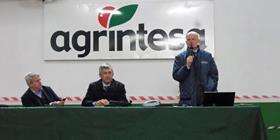
Pear producers across Italy are being encouraged to sign up to a new company called Pera that aims to repeat the success of Italian apple brand Melinda by uniting growers under a single marketing organisation.
Pera, or Pericoltori Emiliano Romagnoli Aggregati (Aggregated Pear growers of Emilia-Romagna), has been set up by one of the country’s leading suppliers Agrintesa, a subsidiary of Italy’s largest fresh produce company, Apo Conerpo, and is led by Melinda’s former managing director Luca Granata, who left his previous employer in March,
Its aim is to maximise producer returns by aggregating supply under a single marketer and therefore achieving economies of scale, reducing competition on the domestic market and boosting the competitiveness of exports.
As reported byEurofruit’s media partner Italiafruit, Granata told a press conference in Modena that he believed a 10 per cent increase in sales could be achieved during the first year, based on the same cultivars and productivity levels, simply by consolidating supply in this way.
The establishment of a strong brand that would create added value was also a central aim of the new group, he added.
“I decided to work on this project because with pears it is possible to create something even better than Melinda, in that almost complete control of production would allow you to determine the price, something which is currently impossible,” he commented.
“However, we need a notable change in mentality. In fact, we need to go from ‘I’ to ‘we’, because it’s only by joining forces that it will be possible to bring new impetus to the sector.”
Granata said he was well aware of the various technical matters that could obstruct closer co-operation, especially for the larger companies.
These could include the sharing of historical sales information; delivering 100 per cent of the fruit to Pera; allowing a new, centralised sales team to market the fruit; and invoicing centrally.
But, said Granata, the advantage in terms of Italy’s presence in the global market was clear: “In essence, no-one will sell pears on their own any more.”
Looking for commitment
Around 200,000 tonnes of pears, equivalent to a quarter of Italy’s total production, are already committed to the new venture, including 180,000 from the project’s backers Agrintesa, Fruit Modena Group and Patfrut.
But that leaves a considerable volume – including around 400,000 tonnes produced in Veneto and Emilia-Romagna – still marketed via other channels.
Italy produces about 700,000 tonnes of pears each year, of which 500,000 tonnes (65 per cent) are grown in Emilia-Romagna, mainly in the four provinces of Modena, Ferrara, Bologna and Ravenna.
Around half of the production is given over to a single variety, namely Abate Fetel.
While pears are the fourth most-consumed fruit in Italy, with a market penetration of 90 per cent, the highly fragmented nature of its supply base is said to create in-fighting on the internal market, which then leads to poor competition abroad.
Stefano Soli, marketing director of Alegra, said this left Italian pears at a disadvantage when it came to competing with Belgium and the Netherlands in particular, and even Portugal, which he said had seized the initiative in the UK market with Rocha pears.
“There are some fundamental aspects such as culture, emotion, nutrition, territory and functionality that, if developed properly, could provide the sector with a major boost, provided there is a common direction and not an Armata Brancaleone [badly organised group] as has happened up until now.”
It remains unclear how willing the other major pear suppliers in Italy – among them companies like Salvi Unacoa, Spreafico, Mazzoni, Granfrutta Zani, Univeg and Apofruit – to sign up to Pera, especially given the rivalry that exists on pears and other products between some of those groups and those backing the project.
However, at Melinda, Granata was involved in bringing together major competitors in the Italian apple trade to establish From, a company which markets the various partners’ fruit in emerging international markets.



